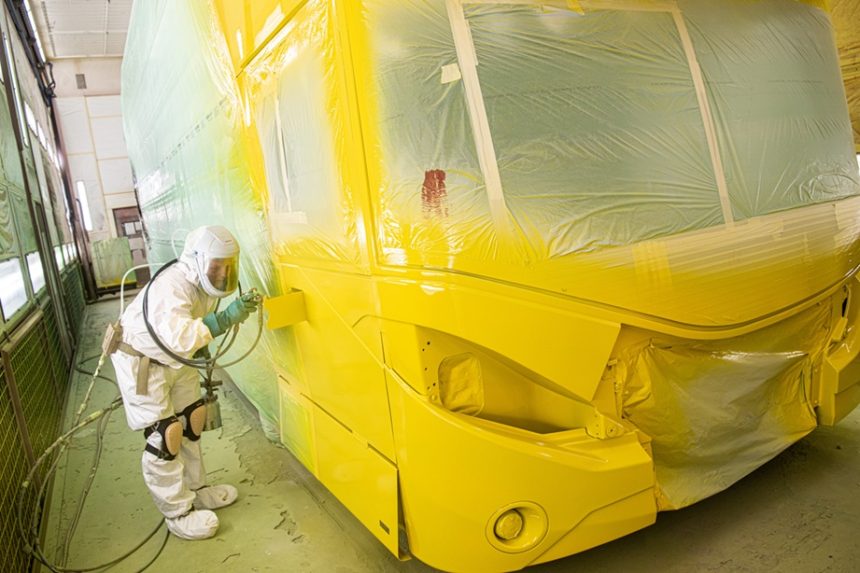Work to secure a pipeline of new bus orders for Alexander Dennis and avoid proposed closures of its manufacturing facilities in Scotland is continuing, Scottish Government Cabinet Secretary for Finance and Local Government Shona Robison said on 16 July.
She was writing to Economy and Fair Work Committee Convener Colin Smyth as part of dialogue following appearance before the Committee of Alexander Dennis President and Managing Director Paul Davies and External Affairs and Marketing Director Debbie McCreath on 26 June.
Mr Davies said then that to postpone the consultation and stop the closure of its plant in Falkirk and suspension of production at Larbert, further orders are required in the region of 70 to 100 buses for 2025 and 300 to 400 for 2026, although he aired needs to bridge a gap in orders this summer and for longer-term change to public procurement policy.
Under its plans, Alexander Dennis will focus domestic manufacturing at its Scarborough factory at the cost of up to 400 jobs in Scotland. Mr Davies told the Committee that Scarborough already broadly accounts for around 75% of the business’s capacity in the UK.
In her letter to Mr Smyth of 16 July, Ms Robison acknowledged the imperatives to secure a short-term order pipeline for Alexander Dennis and to explore what can be done in the longer-term to support domestic bus manufacturing.
“We are liaising with commercial bus operators and local transport authorities to establish the current demand for double-deck buses in Scotland and we are working alongside UK government to identify demand in other parts of the UK,” she says.
“We are also pressing UK government on the details of its recent announcement of £15.6 billion of funding for local transport projects in England’s city regions as part of the Spending Review.”

A furlough scheme for Alexander Dennis employees in Scotland has been suggested, and Ms McCreath told the committee on 26 June that the business wants greater clarity on whether subsidy control rules around local content can evolve.
Writing to Mr Smyth on 2 July, Ms Robison said that the Scottish Government is “working tirelessly” on a furlough scheme, order availability and regulatory change to assist bus manufacturing in Scotland and is in close contact with the UK government as part of those efforts.
A cross-governmental working group has been formed to discuss how to stimulate orders and avert job losses at Alexander Dennis. It involves the Scottish Government, Scottish Enterprise, and the UK government.
Ms Robison adds that the working group is also exploring possibilities within established procurement legislation but notes that key to existing provision is that bidders are treated fairly and without discrimination.
Mr Davies has long been critical of how procurement of zero-emission buses that are part-funded with public money is handled. He has repeatedly claimed that it fails to incentivise domestic production of those vehicles in favour of lower-cost economies.
“Battery costs, the cost of energy for manufacturing and the cost of employment are the key elements that make it challenging when you compare Alexander Dennis [to] a domestic Chinese manufacturer,” he told the 26 June hearing.

In a subsequent letter to the Committee on 1 July, Mr Davies called for “long-term reform” to the subsidy control legal framework if UK bus manufacturers are to remain competitive.
“Despite political ambitions to support local content, authorities are prevented from basing decisions on any wider benefits due to [that] framework,” he writes. “Urgent reform is required to support the future of UK manufacturing and create a more level playing field for domestic manufacturers.”
On a “proposed scheme” that is intended to bridge lead times between the close of the Alexander Dennis consultation on 15 August and work on new orders commencing, Ms Robison adds that efforts around its subsidy control elements are ongoing.
In her letter of 16 July, she says that one idea raised via the cross-government working group is exploration of scope for use of a Crown Commercial Services framework within bus procurement.
Responding to Mr Smyth, Ms McCreath told the Committee on 26 June that if the additional volumes for 2025 and 2026 cited by Mr Davies could be secured and discussions on other factors continue, Alexander Dennis will maintain bus production in Scotland.
It has extended the consultation period on proposed plant closures and job losses by two weeks to support exploration of options but Ms Robison notes that key to the overall issue is “to establish greater confidence in demand for the double-deck vehicles that [Alexander Dennis] manufactures in Larbert.”


























